Are you considering winter Rving in Canada in season, but not sure if it’s right for your family?
Canada offers some of the best camping, hiking, and outdoor activities on the planet. Western Canada in particular will give you some of the most picturesque views on the planet (there’s seriously nothing like the turquoise waters in the Rockies).
But maybe you’re not sure if living in an RV in the winter in Canada is even possible. Canada is known for its harsh weather in the winter months.
Well, it didn’t stop Helen Thomas, mother of 4, from taking a winter Canada winter road trip across British Columbia and Alberta (while homeschooling along the way!).
Today, we’ll learn more about her tips for winter RVing in Canada as well as some of her favorite places for a winter Rving in Canada road trip.
Let’s get started.
Disclaimer: Just a heads up, this free article contains affiliate links. If you purchase after clicking one of these links, I may earn a small commission at no additional cost. Also, as an Amazon Associate, I earn from qualifying purchases. Your support helps me continue to provide helpful and free content for you.
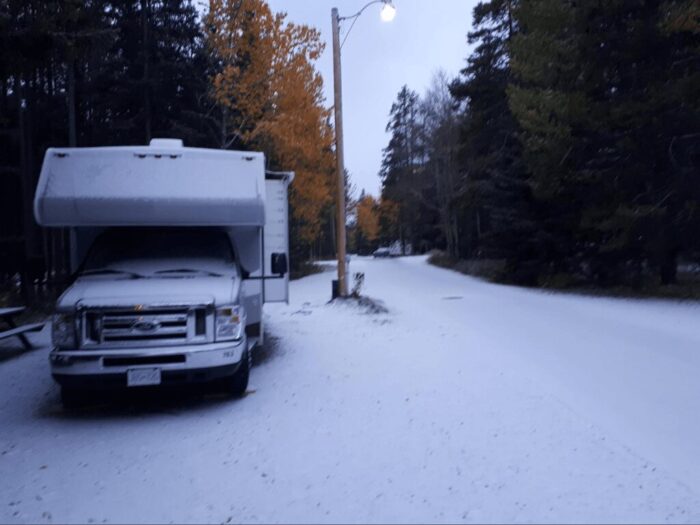
✈️ Book Your Canada Winter Camping Trip: Tips & Tricks ✈️
Book Your Flight
Find cheap flights to Calgary International Airport (YYZ), Edmonton International Airport (YEG) or Vancouver International Airport (YVR) by using Google Flights or Skyscanner. Those three search engine searches different airlines deserving those three international airport, including some low-cost ones.
Rent Your RV or campervan
Outdoorsy and RVezy are great websites to find RVs and campervans. It’s like the Airbnb of Rving. CanaDream and Cruize America also offer RVs suitable for winter camping in Canada.
Book Your Tours
Viator and Get Your Guide are two great hub for finding fun tours in and around Quebec City.
Download a Few Apps to Help You Plan
iOverlander is a great app for dispersed camping. AllTrails will help you plan your winter hikes. The GoWhee app is the perfect app for finding fun kid-friendly activities.
Need Help Planning Your Itinerary
Let me help you plan your custom itinerary.
Winter RVing in Canada: How to Get Started in winter camping in Canada
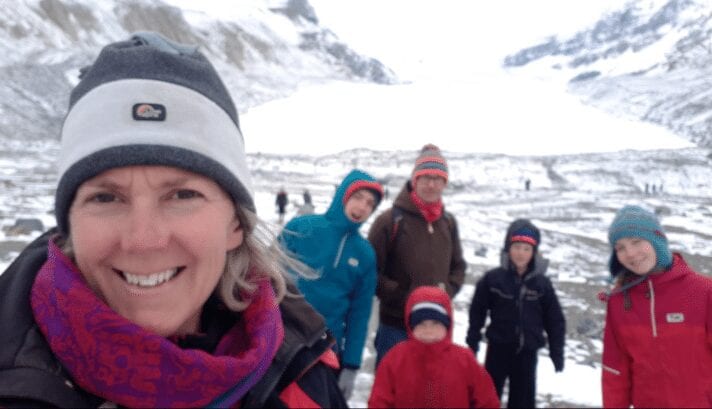
Planing a road trip in the winter takes some adjustment. Winter RVing in Canada takes lots of preparation and flexibility.
Like Helen, who shared her winter RV vacation with us, this kind of trip will probably put you out of your comfort zone, for various reasons. But at the end, you’ll return home with fun memories and beautiful photos.
Why Do a Canada Winter Camping Trip?
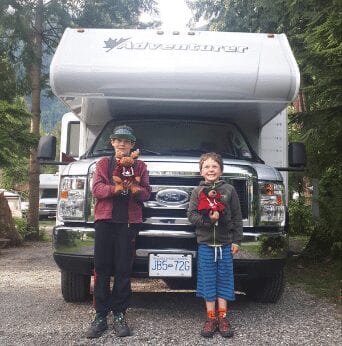
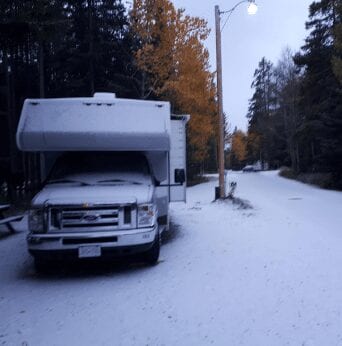
Renting an RV and doing a Canadian winter camping trip will give your freedom to move when you want to without having to book lodging too far ahead.
The RV was most certainly the right choice for Helen’s family.
But remember, it can be cramped and, at times, you may struggle for space. Winter RV living is not the same as RVing during the summer. Most of the time, you can just hang out outside by the picnic table looking at the kids play.
But once we had a routine you can made it work really well.
There are of course some point to keep in mind when RVing in the winter in Canada, such as:
- Making sure to water lines don’t freeze
- Making sure the electric heaters are powerful enough for the cold air
- Making sure the RV parks where you’re planing to travel to are open all year-round.
Pro-tips for Winter RVing in Canada
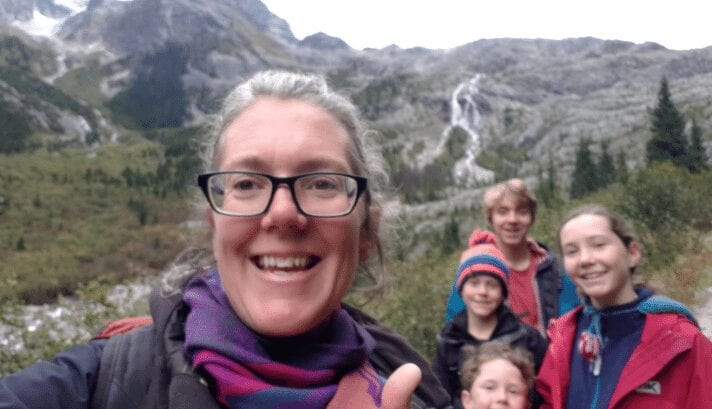
Can you live in an RV in winter in canada? Yes. Surprisingly yes! Some families even live full time in their RVs in Canada.
I would recommend staying closer to Vancouver or Vancouver Island if you’re planning of living in your RV all winter long. But it’s possible.
Now here are a few tips for winter RVing in Canada to have a wonderful winter camping trip.
1. Winterize your RV
If it’s your own RV, you’ll need to make sure it’s winterized properly. Go RVing Canada has a great ressource on the subject.
If you are renting an RV, you’ll what to make sure that everything is ready for the cold weather.
- Take the first few days easy to get used to driving the RV.
It can feel huge. And in cities, you may want to park the RV on the outskirts and walk to the city centre instead.
At first, you’ll to limit your driving in the big cities like Vancouver and Calgary. Maybe walk and avoided taking the RV anywhere off the main roads. Then, you’ll gradually become more adventurous with the RV.
2. Drive slowly and plan short driving road trips
Weather and road condition in the winter can be tricky. It’s even more true when winter road tripping in the Canadian Rockies.
Take your time. Anything more than a couple of hours driving can be just so exhausting.
For example, on Vancouver Island, the roads are slower than in other parts of Canada. It can take a while to drive only a few kilometres, and it’s even worth if there’s a snow storm
Be careful if driving to Takakkaw Falls in the winter: It can be nerve wracking as you’ll have to drive back down via a tight switchbacks.
3. Be flexible and open to change
RV trips are perfect for freedom and flexibility and winter is no excuse.
Try not to plan too much in advance. You never know how the weather and road conditions are going to turn out. Plus, chatting to people is the best way to finding out places to go and local recommendations.
That is why camping and road trips are so enjoyable : you get a chance to speak to other people who are travelling, and they recommend things to do, visit, and places to stay.
You’ll really love the freedom of the RV and the fact that I knew we always had a place to sleep whatever happened. You only need a rough idea of an itinerary and where you want to go. But you’ll see that it will constantly evolve.
4. Plan gear and luggage accordingly
One of the hardest thing to plan when winter RVing in Canada is luggage. It’s hard to keep track of bags.
Make sure you pack as light as possible, but bring all the necessary gear for the weather.
It will be freezing and snowing in the Canadian Rockies while it will most likely be mild. but rainy in Vancouver area. Also, makes you have extra blankets in case the nights are too cold.
One of the challenge of RVing in the winter is staying dry and clean. You’ll be walking out in the rain in Vancouver and having wet coats and muddy shoes to dry off in an already cramped RV.
5. Get you RV on your last day in a big city
If you are renting an RV for your Canada winter road trip from Vancouver or Calgary, you may want to wait on your last day in the city to go get your RV. Driving and most importantly parking a big RV in downtown Vancouver or Calgary can be stressful and not so enjoyable.
Plus, the public transportation is great.
Of course, you may need your RV as soon as your arrive as its your accommodation. In that case, try to find a campground outside the city center but that is deserved by public transportation.
6. Find campground that are open year-round
Not all campgrounds in British Columbia and Alberta will be open in the winter. Plus, some campgrounds are opened in the winter only for seasonal campers.
There are many resources to find the best winter camping in British Columbia and Alberta. Winter camping guide for Alberta is available here.
Winter RVing in Canada: Winter Road Trip Itinerary
Start your trip in Vancouver.
The main airport Vancouver International Airport (YVR) is located 15 km away from downtown Vancouver. It takes less than 30 minutes to reach downtown using public transportation.
Relax on your first day and explore downtown Vancouver. You can go see the Olympic Village, Chinatown and Granville Island.
If you’re searching for a good restaurant, the Lebanese restaurant Nuba is a great option for families.
After the first couple of days adjusting to the RV, head to Revelstoke. On your way to Revelstoke, you can stop for a few days in Kelowna. The Bear Creek campsite is a good pick.
Once in Revelstoke, you can enjoy Mount Revelstoke National Park or go skiing at Revelstoke Mountain Resort. You can find winter camping at Revelstoke campground. The campground is perfect for families and offers full hook ups.
Then, enjoy Glacier National Park. There are a lot of great walking and hiking trails. You can then drive to Golden and spend the night there.
The Kicking Horse Mountain Resort offer complimentary overnight camping in the parking lot area (but there is an hookups). If it’s too cold, there are other options around Golden.
When you are ready, slowly make your way to Banff. Be really careful driving on the Kicking Horses pass.
In Banff, the Tunnel Mountain II campground is open year-round as well as the Lake Louise Trailer Campground. The Tunnel Mountain campground is great because it has a bus service into town (ROAM bus). This mean we can leave the RV and walk to the centre, then catch the bus back.
During your time in Banff this winter, don’t miss: Bow Falls, Whyte Museum of the Canadian Rockies, Cave and Basin Historic Site and ice skating on Lake Louise. Also try The Wild Flour Bakery and Eddies Burger Bar is you feel like eating in.
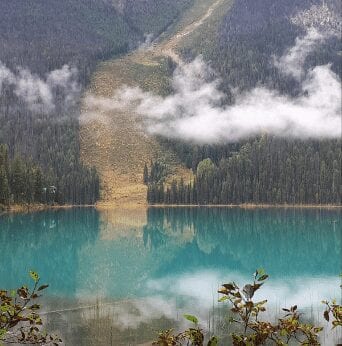
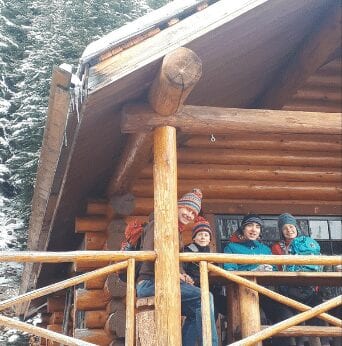
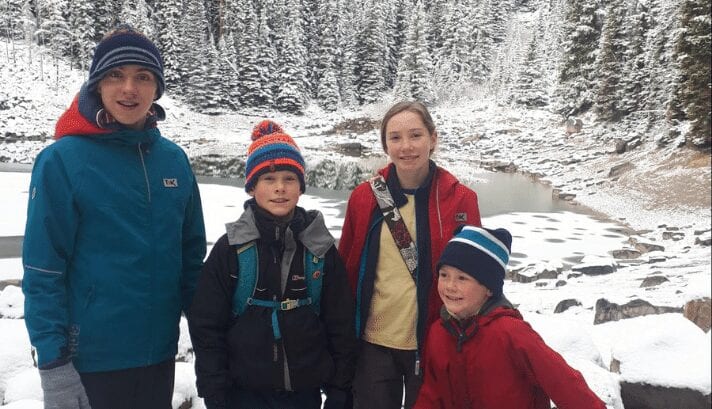
Now, head toward Jasper following the Icefields Parkway.
Note that there are no campground open in the winter on the Icefields Parkway. The closest campground will be Mosquito Creek Campground, then it will be in Jasper.
Temperatures can really dropped on the Icefields Parkway. You’ll want to make sure you can have hookups or a power station available.
Also, make sure you check the road and weather condition before making your way into the Icefields Parkway. The road is occasionally closed in the winter due to poor visibility and avalanche risks.
The drive is stunning and you’ll have plenty of stop to make along the way.
Make sure your dress well especially as you arrive the Columbia Icefields. It can be unbelievably cold when you’re not equipped for those temperatures.
Jasper was beautiful. The Wapiti Winter Campground in Jasper offers sites with electricity.
After visiting Jasper, you can make your way back to Vancouver via Whistler.
Whistler is a great place to do some skiing. Plus, the village is really charming.
If time allow, take the ferry to spend a few days in Vancouver Island.
I am sure you’ll love everything about Vancouver Island:
- change of weather
- stubbing ferry journey
- beautiful views
- a perfect combinaison between mountains and beaches
Tofino and the Pacific Rim National Park is an highlight. You can do a whale watching tour. It’s amazing. You may be lucky and see some grey whales.
The beaches in Tofino is wonderful in the off season. It’s so calming. Relax and have a lovely time spent walking and watching wildlife.
In Tofino, the Green Point Campground is a great option. It a really beautiful camping where you’ll see the sun shining through the trees at sunset, the peace, and the beauty of the beach.
But the drive to Tofino can give you travel sickness. It’s pretty windy.
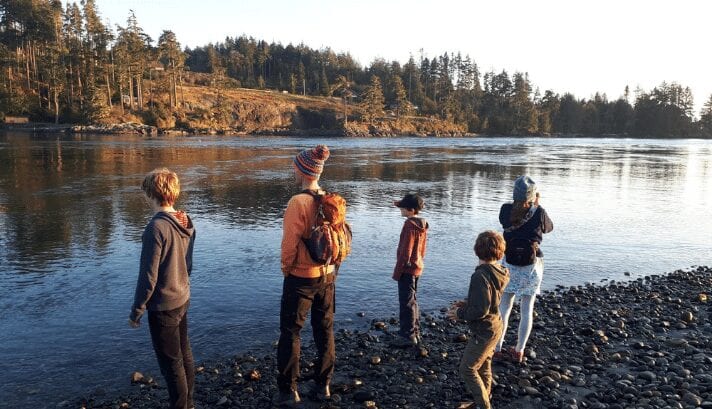
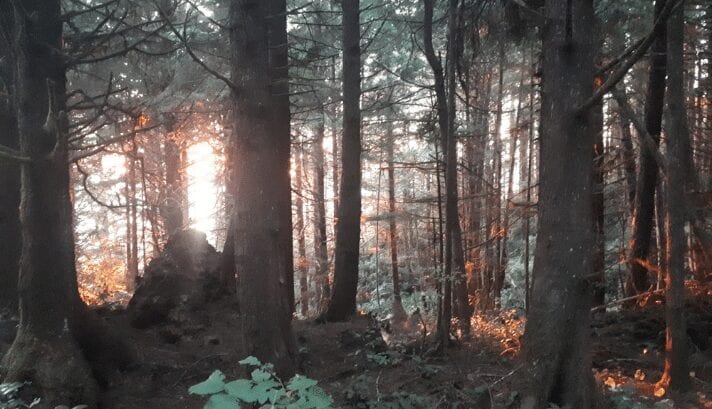
From Tofino, head to Victoria. Remember that the drive is windy and it’s easy to get travel sickness on this road. Take your time.
Try to find a campground out of the city and use local buses to get into the city and enjoyed your time there.
If you feel like trying something new to eat, have lunch at the vegetarian restaurant Green Cuisine. You weigh the food on your plate and pay for what you have. The food was amazing.
One of the days in Victoria, visit Sooke Pot Hole Provincial Park. There are some beautiful walks and you can watch the sea lions at sunset.
Even in the winter, you’ll want to book in advance your ferry to/from Vancouver Island. There are limited space especially when driving a big RV.
Once in Vancouver, you can bring back your RV at the rental and use public transport to get around for the rest of your trip.
You can visit the Museum of Anthropology. They have excellent tour guides. Then, spent a day at Lynn Canyon. If time allows, visit Burnaby Lake.
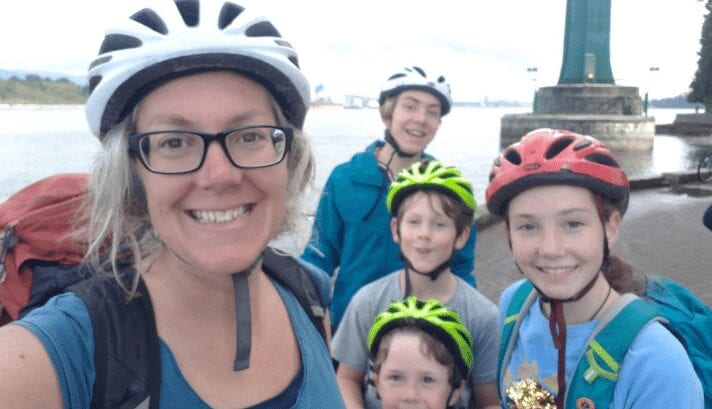
Canada Winter Road Trip Itinerary Recap
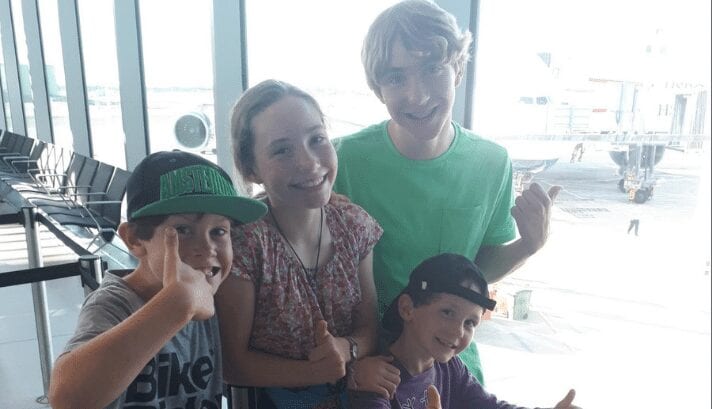
- Vancouver: Science museum, cycle around Stanley Park, self-lead walking tours of the centre, Granville Island, ride on the Seabus, Lynn Canyon, Burnaby Lake, Museum of Anthropology.
- Kelowna: Walks around the Bear Creek campsite, watch salmon
- Revelstoke: Walking around the Martha Creek campground, Revelstoke Mountain
- Yoho National Park: Emerald Lake and Takakkaw Falls
- Banff National Park: Banff centre, Bow Falls, Whyte Museum of the Canadian Rockies, Cave and Basin Historic Site, day trip to Lake Louise on the bus (with a hike in the snow to the Tea Room)
- Icefields Parkway: Stunning drive from Banff to Jasper with a stop at Columbia Icefield and Visitor Center museum and at the Athabasca Falls.
- Jasper: Angel Glacier, Maligne Lake trails, Pocahontas Mine Trail, Miette Hot Springs
- Tofino: walk around the town, whale watch trip, beaches
- Victoria: walks around town (mainly from the Lonely Planet Guide), Sooke Pot Hole Provincial Park, Whiffin Spit
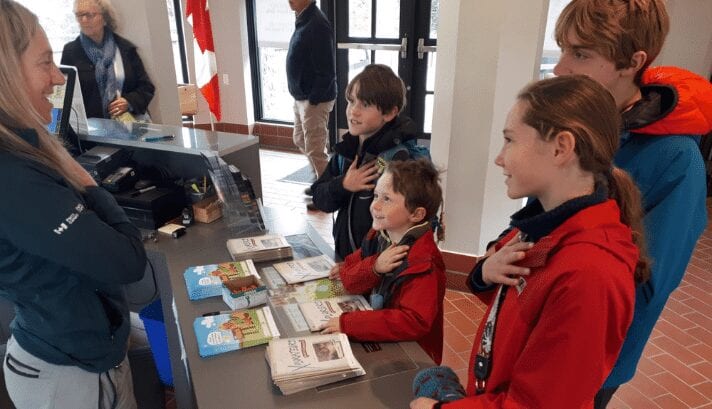
Canada Winter Road Trip: Thank you Helen!
We hope you enjoyed reading about Helen’s experience winter camping in Canada while homeschooling her 4 kids.
We can’t speak for you, but her story was a huge inspiration to us! Especially as we’re planning to start homeschooling our 2 boys in the near future (which STILL sounds exhausting even though it’s only half the children that Helen has).
Helen and her family of 6 are a homeschool family from the UK. They’ve always enjoyed European and UK travel, as well as camping. In 2018, they took a 6-week international trip to Chile which, at the time, they thought would be a once in a lifetime trip.
But they got the taste of longer road trips and decided to book another one to Canada in December 2019.
A big thanks to Helen for sharing her story with us!
If you enjoyed this post, you might also be interested in the following articles:
❤️ You may also like to read: ❤️
Driving Across Canada Tips: How to Make the Perfect Itinerary
Banff Winter:7 Activities to Do With the Family
These will have everything you need to plan a few stops when you’re visiting the western part of Canada.
